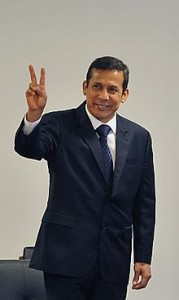Peru: Humala Wrestles With Inclusive Economic Growth
Ollanta Humala kicked off his five-year term July 28 promising to ensure the country´s economic expansion benefits the whole country, a task previous presidents have failed to do.
In his inaugural address in Congress, Humala, who topped Keiko Fujimori, a former lawmaker and daughter of jailed ex-President Alberto Fujimori, who governed from 1990 to 2000, in a run-off vote on June 5, said he will “dedicate all of my energy … so we once and for all erase from our history the damaging face of exclusion and poverty [and] build a Peru for everyone.”

Humala had captured 51.5 percent of the vote over Fujimori’s 48.5 percent, winning 19 of the 24 regions, with most of his support in the impoverished interior of the country. Fujimori’s support was more concentrated in the capital, Lima and four of the northern departments, showing a clear divide of those who have most benefitted from Peru’s more than 10-year economic boom.
Humala promised to increase minimum wage, expand public pension programs to those living in poverty, raise taxes on the multi-million dollar revenues that mining companies earn in the country, expand programs to alleviate poverty, improve nutrition and early education, as well as more scholarship for higher education, and small-scale farm aid.
In an effort to calm worries from the right that some left-leaning policies would derail Peru’s economic growth, Humala tapped pro-free market economists to head the Foreign Trade and Finance Ministries, and kept the current central bank president in his post.
Tackling social conflict
One of Humala’s greatest challenges will be to address and resolve the looming social conflicts inherited from the 2006-2011 government of ex-President Alan García.
According to the nation’s Ombudsman’s Office, 80 percent of the 217 unresolved complaints registered with the body are related to the environmental and social effects — or potential ones — caused by extractive industries.
Such conflicts have left a death toll of 123 over the last five years, according to the National Human Rights Coordinating Group, an umbrella non-governmental organization.
Various sectors, including Humala’s own environment minister, Ricardo Giesecke, have urged the new Congress to pass a law that would require indigenous peoples the right to a previous consultation and a participatory process for any project that affects their collective rights and native lands. A bill had been approved in May 2010, but was sent back by García with a series of changes, including one that said it must be explicit that the indigenous peoples´ decisions will not be binding.
“The people must know what they are going to be consulted about,” said Giesecke. “It has to be a profoundly informative process.”
According to the new environment minister, most social conflicts occur because the local population is not even aware that extractive industry is operating or developing projects on their lands, and a clear law is necessary.
Humala has also called for new laws to dictate land use in the country.
According to Efraín Arana, who heads the Environment Ministry’s department on this issue, said it would establish a plan for the use of Peru’s land that promotes and sustains economic, social, cultural and environmental health. The first step would be to establish environmental and economic zones and sustainable activities for each.
Mining revenue
One of the core issues Humala has vowed to address is higher taxes on windfall profits by mining companies, despite strong resistance from the business sector.
“Mining companies’ extraordinary profits should contribute to the national fight against poverty,” said Humala. “The contracts will be respected and the negotiation, I have no doubt, will let the whole country benefit.”
The National Mining, Oil and Energy Association, an umbrella business organization, argues that the taxes would hurt new investment. But many say these corporations can more than afford it. According to Propuesta Ciudadana, a civil society organization that works in public policies, in 2010 high mineral prices meant a 40 percent profit margin for miners, when historically the margins were closer to 10 percent.
Humala has said he would use the extra revenue to finance new social programs and public works. Under Peruvian law, regions where mining activity is present receive a fund generated by the industry.
Energy and Mines Minister Carlos Herrera Descalzi and Finance Minister Luis Miguel Castilla have said that the new tax would be implemented before the end of the year.
Humala also plans to address a moratorium on genetically-modified seeds. A 10-year moratorium on these seeds stalled shortly before García left office. Peru would become one of the few Latin American countries where the cultivation of genetically-modified seeds is prohibited.
The law must now go back to Congress for debate, but new Agriculture Minister Miguel Caillaux has spoken out in favor of it.
“If Peru adopts the moratorium on the use of transgenic seeds, it would reinforce the country’s image as one that defends its biodiversity,” he said.
